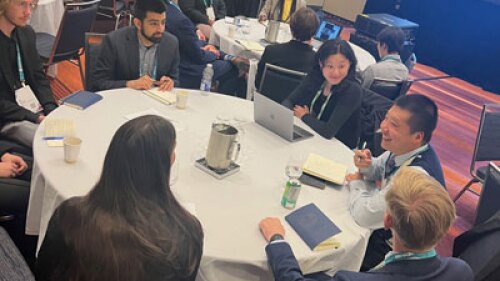François Trausch was appointed the new chief executive officer of Allianz Real Estate, one of the world’s leading property investment and asset managers, on January 1. Trausch previously served as CEO, Asia Pacific, at GE Capital Real Estate for six years, and prior to that, spent 15 years in senior management positions with GE in Europe. An active ULI member, Trausch will serve as chair of the ULI Europe Conference in Paris on February 2 and 3. ULI Connect spoke with Trausch about his goals for the conference and what he sees as the critical issues and broader economic trends facing real estate and land use professionals in Europe.
What are some of the objectives of the ULI Europe Conference?
At the ULI Europe Conference, ULI always makes a point of addressing both short-term topics and long-term trends. I think this year’s conference is no exception. We will have a capital markets panel [and] a panel on the economy and the global geopolitical situation. These are immediate topics. And then you have long-term trends like density and technology, which won’t have an immediate impact on our day-to-day jobs, but which we need to address as an industry. The conference gives real estate professionals the opportunity to discuss and debate all of these pressing issues which will affect the immediate and future success of their business.
In your view, what are the most critical topics, themes, and trends that the property industry needs to be concerned with?
One key topic is where we are in the real estate market: what will 2016 look like? In Europe, the economy is doing better, including in France. However, some questions remain: Will interest rates remain low? What kind of take-up will we have? How strong is the underlying market? How will turmoil in emerging markets and geopolitical instability impact the market? These are all questions people want to think about so they can do a better job planning the year ahead—and issues that we plan to address at the ULI Europe Conference.
Technology is also an important topic. We see newcomers in the office market who are renting space to startups, we see expectations changing in terms of the environment in which people want to work, and we see a renewed focus on CBD [central business district] locations. In retail, we know there will be a stratification of the market between the dominant retail centers that embrace new technologies and benefit from it and those who struggle to adapt.
So technology is both a concern and an opportunity for the industry, depending on how you look at it. And since the real estate industry as a whole is not very innovative, it is important for us to hear from innovators to see what is coming.
How can the real estate industry better address the demands of occupiers?
Up until now, real estate was always highly localized. The question now is to what extent we can create a relationship with tenants that goes beyond a specific city or market and serves them on a broader basis. We know this is already in the works for retail, but could it also be the case for office buildings?
Office tenants these days are expecting a higher level of service in their buildings. I just spent the last six years in Asia, and if you take a market like Sydney, every office building has coffee shops and other amenities. Many tenants are now setting up offices that have shared, flexible space. That also means that the quality of the space is drastically different; the expectations are at a much higher level. For younger generations, this set-up is natural: if you’re used to working with your computer at a café, that’s your expectation when you come to the office.
We are starting to see this trend in Europe as well. It does require [owners] to change their mind-set in terms of lease structure and how long they expect tenants to stay in their building. Office owners will have to deal with a higher turnover than in the past. At the ULI Europe Conference, Mark Gilbreath of LiquidSpace will give his own insights into the opportunities this new model provides.
What are the broader economic trends happening across Europe, and what do they mean for real estate?
The major trend is the European recovery. The expectation of Eurozone GDP growth for the next three years is 1.7 percent, so for once we will benefit from the collapsing prices of commodities.
So European recovery is happening, but this recovery will not affect every country in the same way. We have seen some of the non-Eurozone economies doing well, and we have seen some of the smaller economies doing well, like Ireland, Spain, and Luxembourg. Even France, which has been a laggard, will be above 1 percent in terms of growth.
That’s good news. But we know by looking at the U.S. that this does not automatically translate into job creation, unemployment going down quickly, or consumption shooting up. We have to be aware that this might not necessarily translate into immediate positive impact on the day-to-day economy. For me, though, it means that investing in real estate is still a good and safe proposition.
Density has been chosen as one of the key themes of the Europe conference. What significance does density have in the real estate industry?
Urbanization is still ongoing in Europe. People are moving away from small towns and want to live in bigger cities. The topic of density is crucial in these circumstances because it helps everybody to live comfortably together.
When some people hear the word density, they think it is a bad word. We need to educate people that density is good. Density actually enhances people’s quality of life. Of course, it has to come with good infrastructure and good transportation—and I think this may be where European cities have been lagging. You take a city like Tokyo, which has one of the most sophisticated transportation systems in the world: people are willing to put up with a city of 30 million inhabitants because of the extremely efficient infrastructure which comes with it. This is one of the topics we will see at the ULI Europe Conference: why density is good, why density is necessary, and what needs to come with it.
Register today for the ULI Europe Conference, a convening of more than 600 decision-makers from all sectors of the real estate industry, including institutional investors, funders, developers, advisers, planners, architects and city leaders. The conference provides the perfect forum for attendees to gain new insights into the latest real estate trends, as well as make new connections and strengthen existing relationships.
This interview was conducted by Catherine Gregory, manager of strategic communications in the ULI Europe office.




